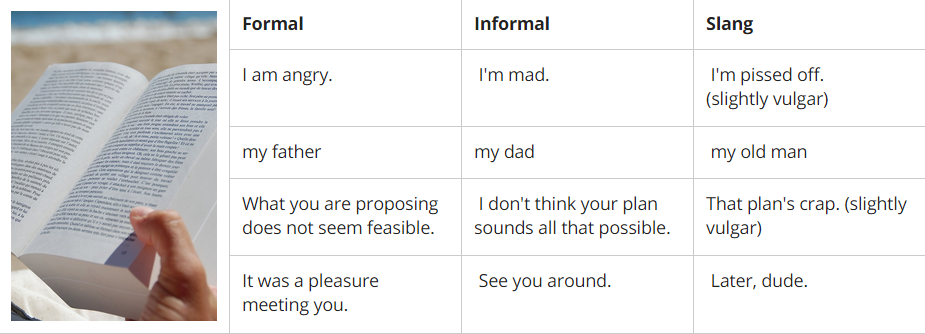说点什么吧~
“It probably never ends.”

一、 Why vocabulary matters
You can read and look at words, but you need to practice to really put them to use, to develop the strong vocabulary you want.The key is to find a way to turn passive vocabulary into active vocabulary.
Passive被动 vocabulary = words you understand ,but don't use in your speaking or writing.
Active主动 vocabulary = words you use when you talk and write
In fact, it probably never ends.
二、Eight ways to develop vocabulary
1.Learn categories
Avoid single word memorization 避免单个单词记忆
Think about groups of words 想想词组
例如:
I highly recommend 强烈推荐
You do this from time to time 时不时.
You can learn words by their categories种类.
2.Journal & sticky notes 日记和便签
carry a notebook
write down words that seem important
Later,look them up,write sentences using them
use sticky nots as labels
write the word and post the notes around the house 把写的字贴到家里所有地方
3.Collocations 搭配
A collocation is a combination of words that appear together frequently.
搭配是一种组合词,经常出现在一起。
Lions roar //狮子吼叫
Depressed people can commit suicide //沮丧的人会承诺自杀
Discover collocations dictionaries //发现搭配词典
Think about word gruops, not individual words. 想想词群,而不是独立的单词。
4.Mnemonics 记忆术
Create your own mnemonics
Example Italian for butterfly :farfalla
A butterfly flies so high it falls for(far-fall-a)
Consult the Mnemonicdictionary.com
5.speak it,write it
Put a new word to use immediately立即
write it down
use it in a sentence
use it three times in a day
6.Area specific 具体 adj
Learn words related to a particular arera(学习单词的相关区域),such as job-related or study area related
words for architects
words for car mechanics
words for cooks
Make word tree,charts,wheels,etc
7.observation journal 观察日记
Keep a small notebook or file on your laptop or tablet 笔记本或平板
Go sit somewhere
Name everything you can see
If you don't know the name of something,write it in your native language,or take a picture of it,then look it up later
Go to different places to do this activity-parks,airports,office building ,etc=et cetera 等等
8.spaced repetition (srs) 间隔记忆
Spaced repetition is a proven memory technique that helps you keep what youve learned strong in your mind.
间隔重复是很有效的记忆技巧,有助于将学过的知识牢牢记在大脑里。
三、Understanding Tone and Diction 语气和措辞
The words you choose can be formal, informal, or colloquial/slang(正式、非正式、口语/俚语). Using slang when you should be writing formally is a big mistake. Similarly, if you are overly formal in a situation(情况) that calls for informality, you risk insulting your reader as well.
同样,如果你有时候过于正式,例如要求不要拘束的时候,将会有侮辱读者的风险

Errors in diction 发音/措辞
There are two main sources of error in diction. 在措辞上有两个主要错误
Choosing the wrong word. This can happen because of confusion between homonyms (words that sound alike but are spelled differently), or because the meaning of the word isn't fully understood.
因为混淆同音异义词,(单词看起来相同,但拼写不同),或者因为单词完全不懂
2. Choosing colloquial, or less formal
spoken language when standard or more formal language is called for (or vice versa). In academic writing, formal diction is generally expected.
例如:
1. A lot/lots of
Colloquial: Diana likes her apartment a lot.
Formal: Diana likes her apartment公寓 very much.
Colloquial: There are lots of books in our library.
Formal: There are many books in our library.
2. Among/between 在..之间
(Tip: Among involves 涉及more than two; between involves only two)
Colloquial: Discussions between our group members were often very lively活泼的.
Discussions Formal: Discussions among our group members were often very lively.
3. Around/ about
(Tip: Don't use around to indicate周围 time, distance距离, or other quantity其他数量.)
Colloquial: The class usually begins around nine.
Formal: The class usually begins at about nine.
4. Badly
(Tip: "Badly" is not a substitute替代 for "very much.") suitable合适的
Colloquial: The team wanted to win really badly严重非常.
Formal: The team wanted desperately猛烈的 to win. 这个队伍十分想赢
5. Based off of 基于,以..为基础
Colloquial: Based off of that information, we can move ahead with the plan. 基于这些信息,我们的计划可以提前
Formal: Based on that information, we can move ahead with the plan.
6. Because
(Tip: Don't use "because" after " reason.")
Colloquial: The reason for our flight delay is because of bad weather.
Formal: The reason for our flight delay is the bad weather.
7. A bunch/bunches 一束、一群、一帮、一组
(Tip: Use bunch or bunches only for things that are bound or grow together, like bananas and grapes; it is not used for other countable可数 nouns.名词)
Colloquial: A bunch of us are going to the movies tonight.
Formal: A group of us are going to the movies tonight.
Formal: There are three bunches of bananas on the counter. 柜台上有三串香蕉
8. Each other/one another 彼此/另一个
(Tip: Each other refers to two, one another refers to more than two.)
Colloquial: Everyone at the party wished each other a happy new year.
Formal: Everyone at the party wished one another a happy new year.
Formal: My sister and I wished each other a happy new year.
9. Guys
Colloquial: I hope you guys can join me at the restaurant.
Formal: I hope all of you can join me at the restaurant.
10. In / Into 在里面/从外边到里边,伴随动作
(Tip: "In" means "within" or "inside", while "into" refers to the motion of going from outside to inside.)
Colloquial: Bill went in the bus station to buy a ticket.
Formal: Bill went into the bus station to buy a ticket.
A connotation is an idea or feeling that a word may hold that is in addition to its main meaning (or denotation). These additional meanings are often cultural or emotional in nature, so they can be hard to understand if you only consult a dictionary.
有些词很难理解,附加文化或者情绪,他们有多重含义
Tone is the emotion of a piece of writing. 语气是一篇文章的情感
Like happy、serious、humorous、sad、formal 、optimistic 、threatening
Tone is important because it lets the reader know your attitude towards your subject 。 因为语气让你知道作者对主题的态度,所以语气很重要.
Tone is related to the author's intentions. The mood is the attitude the reader has toward the writing.
语气与作者的意图有关。心情是读者对写作的态度。
.........
说点什么吧~
欢迎来到学堂在线广场~
在这里你可以玩活动,看资讯,晒笔记。
还可以交学友、发心情、聊人生。
在学堂的每一天,就从这里开始吧!
点击 广场指南 了解更多